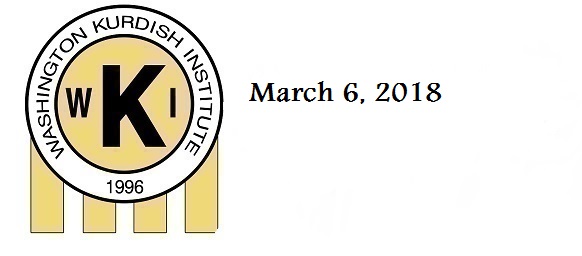1.1K
Iran
- On March 1, a remote bomb exploded on a car belonging to members of the Iranian Kurdish opposition – the Democratic Party of Iranian Kurdistan (KDP-I) – in Erbil, Kurdistan region of Iraq. The explosion targeted Salah and Sabah Rahmani (father and son) who are prominent Peshmerga members of the KDP-I. On March 3, the KDP-I released a statement accusing the Iranian regime of targeting their members: “the Iranian regime carried out a terrorist attack against two members of KDP-I in Hawler (Erbil), the capital of Iraqi Kurdistan. Unfortunately, one of the victims, 33-year-old Sabah Rahmani, died yesterday.” The KPD-I blamed the Iranian regime for the attack since it occurred after they held a successful party congress last month in Iraqi Kurdistan and vowed struggle against Iran.
- After the recent Iranian uprisings, hundreds of Kurdish students and activists remain in prison. Last week another Kurdish student was killed under torture after being jailed by Iranian Intelligence office. The Kurdistan Human Rights Association reported that Qubad A’dami’s corpse was given to his family and threats were made against the family to not hold any public funeral for him. The regime’s intelligence officers told A’dami’s family that their son had committed suicide by drugging himself. The death toll among detainees in Iran’s jails have risen since January 2018. In Orumiyeh, the Kurdistan Human Rights Network reported that a Kurdish student (Ibrahim Khalidi) has been sentenced to five years in prison due to his participation in the recent uprisings in Iran. Khalidi was charged for acts “against national security.”
Iraq
- On March 3, despite the boycott of the Kurdish alliance bloc, the Iraqi Parliament passed the federal budget of 2018 with allocation of 12.67% to the Kurdistan region. The budget bill sparked anger among all Kurdish parties and people of Kurdistan since it decreased Kurdistan’s share from 17% since 2003. Later, and after pressure from the Kurdish factions, the Iraqi Parliament increased the budget from 12.67% to 14%. In a reaction to the bill, the Kurdistan Regional Government’s Prime Minister Nechirvan Barzani said: ” this was not the Iraq we wanted after 2003.” The budget bill united the Kurdish parties of pro-KRG and the opposition parties. Meanwhile the Kurdistan region’s airports remain closed by Baghdad and the employment salaries of Kurdistan are still withheld by the Iraqi government. Several Kurdish politicians called the Kurdish leadership to withdraw from the political process in Iraq.
- After agreement between the lawmakers on behalf of Kirkuk, the Iraqi parliament voted to hold the provincial elections in Kirkuk on December 22, 2018, which will be 13 years since the last local elections in the province. The agreement included: share of power among the ethnic groups without allocation by percentage for each component and to review voter registration by a committee till December. On security, ISIS terrorists clashed with Iraqi forces and militias in several villages in the Hawija district.
Syria
- Turkey’s invasion of Afrin with extremist groups continued for its 6th week amid more civilian casualties. On March 5, the Turkish airstrikes on the Jindriss district resulted in the deaths of 13 civilians, including 3 children. Video showed the destruction of the town after the strikes. In the Shira district, shelling continued by Islamic factions supported by Turkey which resulted in civilian casualties. As villages around the Jandriss district fell under the Islamic factions, some of the Turkish-backed fighters looted farming equipment belonging to the Kurdish farmers and described it as “spoils of war.” The U.S. officials announced “operational pause” for the campaign against ISIS, as the Kurdish fighters are distracted by the Turkish invasion. The U.S.-backed Syrian Democratic Forces (SDF) announced more deaths among their ranks after clashes with Turkish military and Islamic factions in Afrin. The multi-ethnic Syrian Democratic Council (SDC) denounced the Turkish aggression and called the United Nations to investigate the killings of civilians. “Call upon the UN to undertake its responsibilities and conduct an investigation of these crimes and bind the Turkish authorities to stop the interference in the Syrian affairs and stop shooting civilians,” read the SDC’s statement. After the United Nations Security Council approved a resolution for immediate cease fire in Syria, on March 6, during a speech, Turkey’s President Recep Tayyip Erdogan said: “Damn your [UNSC] resolution in Syria.”
- The Czech authorities released the Syrian Kurdish leader Salih Muslim after detainting him for 48 hours. A court ordered his release after Turkey requested his handover to Ankara. After Muslim’s release, Turkey asked Germany to extradite him. After his release Muslim thanked those who supported him and denied all the accusations made by Turkey against him. Muslim is the former Co-President of the Kurdish Democratic Union Party (PYD), a major ruling party in the Northern Syrian Federation.
Turkey
- The Turkish government has sentenced two more pro-Kurdish Peoples’ Democratic Party (HDP) lawmakers to prison. Representative of Sanliurfa, Dilek Ocalan was sentenced for two and half years in prison for spreading “terrorist propaganda.” Another HDP lawmaker, Selma Irmak was sentenced for ten years in prison for “membership in a terrorist group.” So far 9 HDP MPs been revoked of parliamentarian status by the Turkish government.
- After alarming reports of torture and mistreatment of prisoners in Turkey, the HDP released a statement warning the UN and other international organizations of the situation of the prisoners in Turkey: “Since the ruling AKP[Party of Justice and Development] came to power in 2002, prison population has dramatically increased in the country.” read the HDP statement. “Following the abortive coup in 2016, grave human rights violations have become even more rampant and massive arrests have filled Turkish prisons with countless political dissidents.” Added the statement.

